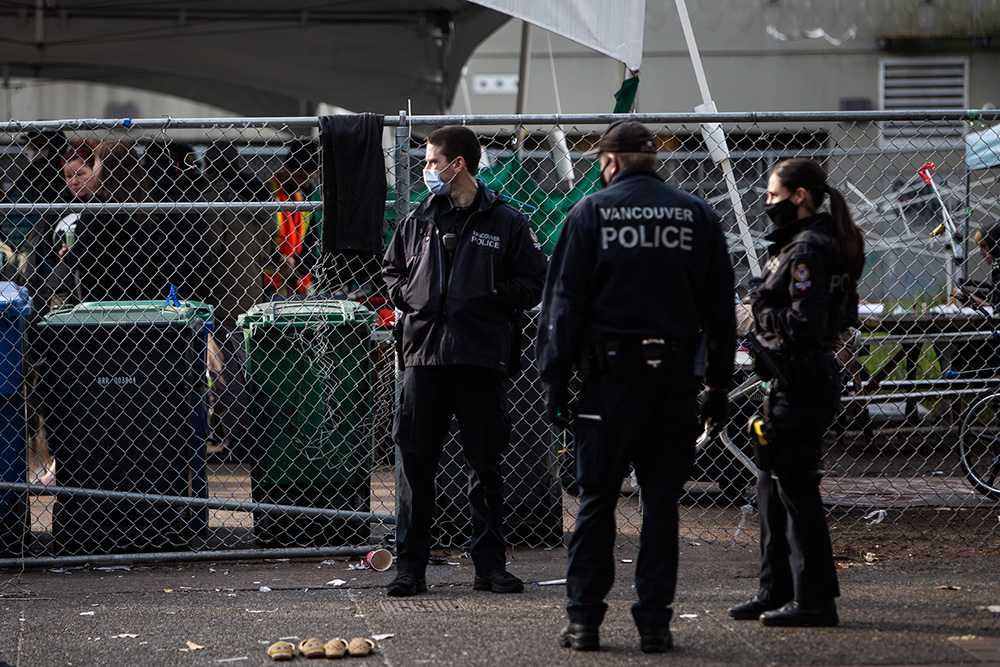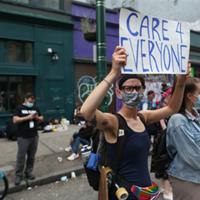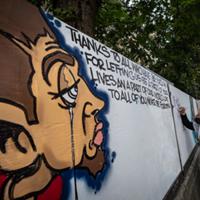Mayor hopes talks will be a step toward a ‘health-focused’ approach to drug policy amid overdose crisis.
Moira Wyton 27 Jan 2021 | TheTyee.ca
Moira Wyton is The Tyee’s health reporter. Follow her @moirawyton or reach her here.
This reporting beat is made possible by the Local Journalism Initiative.


Decriminalization means people with drugs for personal use would not have to fear arrest or seizure of their supplies. Photo by Jesse Winter.
The federal government has agreed to begin discussions about decriminalizing drug possession in Vancouver, Mayor Kennedy Stewart said today.
We’ve got a global crisis or two — or three — on our hands. Let’s take these solutions into 2021.
“This is another hopeful and critical milestone on the path towards fully embracing a health-focused approach to substance use in the City of Vancouver,” said Stewart in a news release.
City council backed decriminalization in November, and on Dec. 7 the city wrote to federal Health Minister Patty Hajdu asking for an exemption from possession prohibitions in the Controlled Drugs and Substances Act.
Stewart hopes Vancouver’s decriminalization model would prioritize health interventions for substance use and end arrests and seizures when people have small amounts of drugs for personal use.
In a Monday letter to Stewart and Vancouver Coastal Health chief medical officer Dr. Patricia Daly, Hajdu agreed to discussions.
The federal government has agreed to begin discussions about decriminalizing drug possession in Vancouver, Mayor Kennedy Stewart said today.
We’ve got a global crisis or two — or three — on our hands. Let’s take these solutions into 2021.
“This is another hopeful and critical milestone on the path towards fully embracing a health-focused approach to substance use in the City of Vancouver,” said Stewart in a news release.
City council backed decriminalization in November, and on Dec. 7 the city wrote to federal Health Minister Patty Hajdu asking for an exemption from possession prohibitions in the Controlled Drugs and Substances Act.
Stewart hopes Vancouver’s decriminalization model would prioritize health interventions for substance use and end arrests and seizures when people have small amounts of drugs for personal use.
In a Monday letter to Stewart and Vancouver Coastal Health chief medical officer Dr. Patricia Daly, Hajdu agreed to discussions.
“Health Canada officials will work with officials from the City of Vancouver and Vancouver Coastal Health to better understand the framework you are proposing,” Hajdu wrote. “I am committed to our continued work to identify options that respond to the local needs of the City of Vancouver.”
At least 367 people died of toxic drug overdoses in Vancouver between January and November 2020 in what is on track to be the deadliest year on record for overdoses in B.C.

NDP and Greens Push Trudeau to Answer Vancouver’s Call to Decriminalize Drugs
READ MORE
“This news comes at a time when the overdose crisis in our city has never been worse, with a person a day still needlessly dying due to poisoned drugs,” said Stewart.
Decriminalization would remove criminal penalties for possession of illicit drugs for personal use. Manufacturing and distributing drugs would remain illegal.
Experts in substance use and public health, including provincial health officer Dr. Bonnie Henry, her predecessor Dr. Perry Kendall and their federal counterpart Dr. Theresa Tam, agree on a public health approach to drug use and have called for decriminalization as a means of curbing skyrocketing overdose fatalities.
Section 56 of the act grants the health minister to issue an exemption to any part of the legislation, including provisions making drug possession illegal, “if, in the opinion of the Minister, the exemption is necessary for a medical or scientific purpose or is otherwise in the public interest.”
It is the same mechanism the city used to establish North America’s first supervised injection site, Insite, in 2003, and more recently to allow health-care providers to prescribe alternatives to street drugs as a part of safer supply measures.
Hajdu also wrote that this is an opportunity to address racism and discrimination in the legal system as it relates to substance use.

Vancouver Voted to Decriminalize Drugs. Now What? READ MORE
“This news comes at a time when the overdose crisis in our city has never been worse, with a person a day still needlessly dying due to poisoned drugs,” said Stewart.
Decriminalization would remove criminal penalties for possession of illicit drugs for personal use. Manufacturing and distributing drugs would remain illegal.
Experts in substance use and public health, including provincial health officer Dr. Bonnie Henry, her predecessor Dr. Perry Kendall and their federal counterpart Dr. Theresa Tam, agree on a public health approach to drug use and have called for decriminalization as a means of curbing skyrocketing overdose fatalities.
Section 56 of the act grants the health minister to issue an exemption to any part of the legislation, including provisions making drug possession illegal, “if, in the opinion of the Minister, the exemption is necessary for a medical or scientific purpose or is otherwise in the public interest.”
It is the same mechanism the city used to establish North America’s first supervised injection site, Insite, in 2003, and more recently to allow health-care providers to prescribe alternatives to street drugs as a part of safer supply measures.
Hajdu also wrote that this is an opportunity to address racism and discrimination in the legal system as it relates to substance use.

Vancouver Voted to Decriminalize Drugs. Now What? READ MORE
Indigenous peoples in B.C. are more likely to die of an overdose and across Canada are incarcerated at a rate nearly six times higher than non-Indigenous adults.
“We must explore policy measures that reduce harm to racialized communities, and explore alternatives to criminal penalties that can begin to address the systemic inequities these communities face,” said Hajdu.
Stewart said in November he hopes Vancouver’s model will be based on voluntary treatment and expanded support rather than relying on fines and mandatory treatment, as Oregon’s recently approved model does.
“While 2020 looks to be the deadliest year on record for overdoses, I am hopeful that this news from Ottawa can mean that 2021 will be different,” Stewart said in the news release.

No comments:
Post a Comment